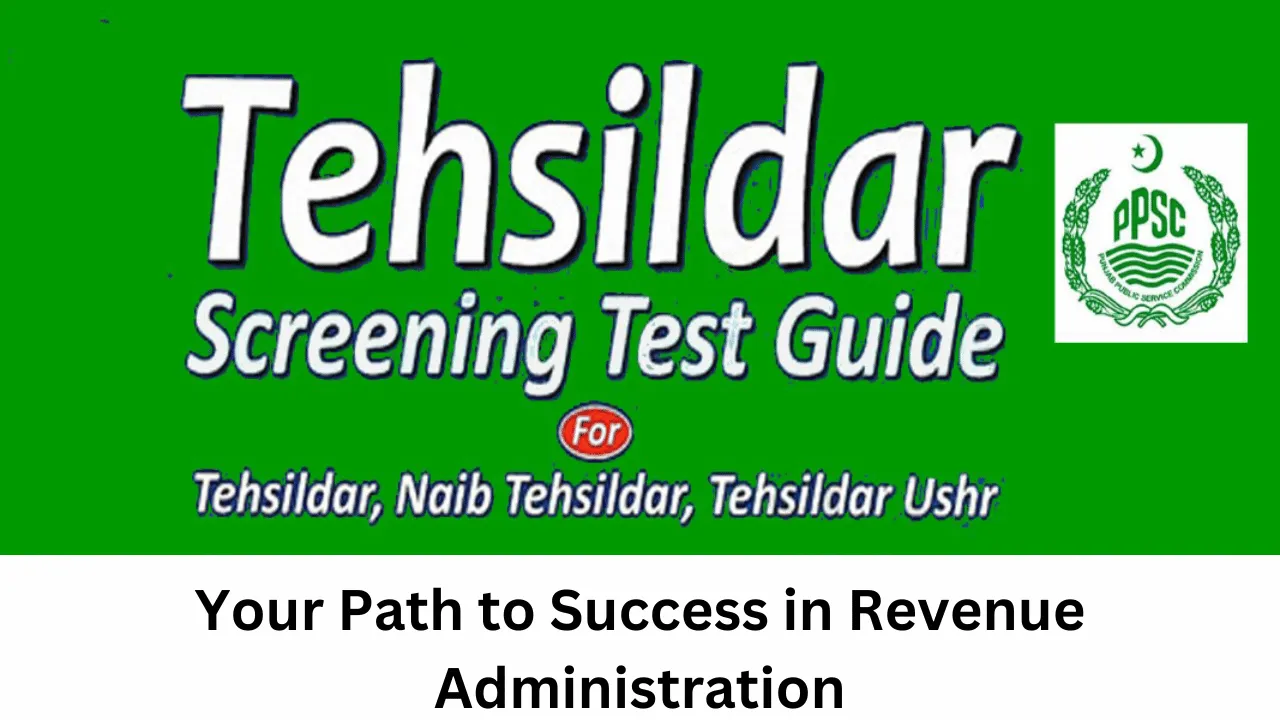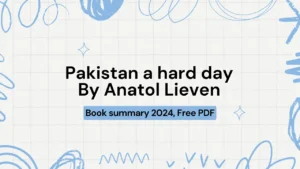Tehsildar Screening Test Guide:تحصیلدار free pdf read online
Comprehensive Tehsildar Screening Test Guide: Your Path to Success in Revenue Administration

Are you aspiring to join the ranks of revenue administration and make a significant impact in public service? The role of a Tehsildar is crucial in local governance, and the journey begins with clearing the Tehsildar Screening Test. This comprehensive guide is designed to equip you with the knowledge, strategies, and confidence needed to excel in this important examination.
Whether you’re a fresh graduate or a seasoned professional looking for a career change, this article will provide you with a roadmap to navigate the complexities of the Tehsildar Screening Test. From understanding the exam pattern to crafting an effective study plan, we’ve got you covered. Let’s embark on this journey to kickstart your career in revenue administration!
Understanding the Tehsildar Position
Before diving into the exam preparation, it’s essential to grasp the significance of the role you’re aspiring for. A Tehsildar is a key figure in revenue administration, responsible for maintaining land records, collecting land revenue, and overseeing various administrative tasks at the tehsil level.
Key Responsibilities of a Tehsildar:
- Managing land records and resolving land-related disputes
- Collecting land revenue and other government dues
- Implementing government schemes at the grassroots level
- Coordinating disaster management efforts in their jurisdiction
- Supervising local elections and census operations
The position of Tehsildar offers a unique blend of administrative authority and public service, making it an attractive career option for those passionate about governance and community development.
Overview of the Tehsildar Screening Test
The Tehsildar Screening Test is the first hurdle in the selection process for this esteemed position. It’s designed to assess candidates’ basic knowledge and aptitude for the role.
Key Points about the Screening Test:
- Conducted by state public service commissions or revenue departments
- Typically held annually or bi-annually, depending on vacancies
- Eligibility usually requires a bachelor’s degree in any discipline
- Age limits vary by state but generally range from 21 to 35 years
The screening test serves as a filter to identify candidates suitable for further stages of the selection process, which may include a main written exam and an interview.
Exam Pattern and Syllabus
Understanding the exam structure is crucial for effective preparation. While the exact pattern may vary slightly between states, here’s a general overview:
Exam Structure:
- Duration: Usually 2-3 hours
- Question Format: Multiple Choice Questions (MCQs)
- Total Questions: 100-150
- Negative Marking: Often applied, with 0.25 to 0.33 marks deducted for wrong answers
Syllabus Breakdown:
- General Knowledge and Current Affairs (30%)
- National and international events
- Indian history and culture
- Geography of India and the world
- Economic and scientific developments
- Indian Constitution and Polity (20%)
- Constitutional framework
- Fundamental rights and duties
- Structure of government
- Local self-governance
- Basic Mathematics and Reasoning (20%)
- Arithmetic and data interpretation
- Logical reasoning and analytical ability
- Land Revenue Code and Administration (20%)
- Basic concepts of land revenue
- Land records management
- Revenue laws specific to the state
- Local Language Proficiency (10%)
- Reading comprehension
- Grammar and vocabulary
It’s important to note that the exact weightage and topics may vary, so always refer to the latest official notification for the most accurate information.
Preparation Strategies
Effective preparation is the key to success in the Tehsildar Screening Test. Here are some strategies to optimize your study efforts:
- Create a Study Plan
- Assess your current knowledge level
- Allocate time for each subject based on your strengths and weaknesses
- Set realistic daily and weekly goals
- Time Management
- Use the Pomodoro Technique: 25 minutes of focused study followed by a 5-minute break
- Dedicate specific time slots for different subjects
- Include revision periods in your schedule
- Effective Note-Taking
- Use mind maps for visual learning
- Create concise summaries for quick revision
- Utilize flashcards for important facts and figures
- Utilize Online Resources
- Access free study materials from government websites
- Join online forums and study groups for peer learning
- Use educational apps for on-the-go learning
Remember, consistency is key. Stick to your study plan and adjust it as needed based on your progress.
Subject-wise Preparation Tips
Let’s break down each subject area and explore effective preparation strategies:
General Knowledge and Current Affairs
- Read newspapers and magazines daily
- Follow reputable news websites and apps
- Create a “Current Affairs” diary to jot down important events
- Focus on India-centric news and developments
Indian Constitution and Polity
- Start with NCERT books for a strong foundation
- Study the Preamble, Fundamental Rights, and Directive Principles thoroughly
- Understand the structure and functions of various constitutional bodies
- Practice MCQs on constitutional amendments and landmark judgments
Basic Mathematics and Reasoning
- Review basic arithmetic operations and percentages
- Practice data interpretation from graphs and tables
- Solve puzzles and logical reasoning questions daily
- Time yourself to improve speed and accuracy
Land Revenue Code and Administration
- Obtain the latest land revenue code of your state
- Understand key terms related to land administration
- Study the hierarchy of revenue officials and their roles
- Focus on recent reforms in land record management
Local Language Proficiency
- Read local newspapers and literature
- Practice writing short essays on various topics
- Enhance your vocabulary through word-building exercises
- Listen to regional news channels to improve comprehension
Mock Tests and Practice Papers
Simulating exam conditions is crucial for building confidence and improving time management. Here’s how to make the most of mock tests:
- Attempt at least one full-length mock test weekly
- Analyze your performance to identify weak areas
- Time yourself strictly to mimic exam pressure
- Review incorrect answers to understand your mistakes
Several online platforms offer free and paid mock tests specifically for Tehsildar exams. Utilize these resources to gauge your preparation level.
Physical Fitness Requirements
Some states may include a physical fitness test as part of the selection process. While not always part of the screening test, it’s wise to maintain good physical health. General fitness standards often include:
- Running a specified distance within a time limit
- Completing physical tasks that demonstrate strength and agility
Incorporate regular exercise into your routine to ensure you’re prepared for any physical requirements.
Application Process
Follow these steps to apply for the Tehsildar Screening Test:
- Check Eligibility: Ensure you meet all criteria specified in the official notification
- Online Application: Fill out the application form on the official website
- Document Upload: Scan and upload required documents (degree certificates, ID proof, etc.)
- Fee Payment: Pay the application fee through the specified online method
- Confirmation: Save and print the completed application for future reference
Mark important dates on your calendar, including the application deadline and exam date.
Exam Day Preparations
Proper planning for the exam day can help reduce stress and improve performance:
- Reach the exam center at least an hour before the scheduled time
- Carry your admit card, valid ID proof, and required stationery
- Read instructions carefully before starting the test
- Attempt easier questions first to build confidence
- Use elimination techniques for difficult MCQs
Stay calm and focused throughout the exam. Remember, your preparation will pay off!
Post-Exam Process
After taking the screening test:
- Results are typically announced within 1-2 months
- Check the official website regularly for updates
- If successful, prepare for the next stages (main exam, interview)
- If unsuccessful, analyze your performance and plan for the next attempt
Remember, clearing the screening test is just the first step. Stay motivated and continue your preparation for subsequent stages.
Success Stories and Tips from Previous Toppers
Learning from those who’ve succeeded can provide valuable insights. Here are some tips from previous Tehsildar exam toppers:
- “Focus on understanding concepts rather than rote learning.”
- “Regular newspaper reading helped immensely with current affairs.”
- “Solving previous years’ question papers gave me a good idea of the exam pattern.”
- “Don’t neglect your physical health during preparation.”
Remember, everyone’s journey is unique. Find strategies that work best for you and stay committed to your goal.
Frequently Asked Questions
- Q: Is coaching necessary to clear the Tehsildar Screening Test? A: While coaching can be helpful, it’s not mandatory. Many candidates succeed through self-study with the right resources and dedication.
- Q: How many attempts are allowed for the Tehsildar exam? A: The number of attempts varies by state. Some states have no limit, while others may restrict attempts. Check the latest notification for specific details.
- Q: Can I apply for the Tehsildar exam if I’m in my final year of graduation? A: Most states allow final year students to apply, provided they obtain their degree before the final selection. Verify this in the official notification.
- Q: Is knowledge of the local language compulsory? A: Yes, proficiency in the local language is usually required as Tehsildars interact extensively with the local population.
- Q: What is the average salary of a tehsildar? Salaries vary by state but generally fall in the range of ₹35,000 to ₹60,000 per month, plus additional allowances and benefits.
Conclusion
Embarking on the journey to become a Tehsildar is both challenging and rewarding. The screening test is your first step towards a fulfilling career in revenue administration and public service. By following this comprehensive guide, you’ve equipped yourself with the knowledge and strategies needed to excel in the examination.
Remember, success in the Tehsildar Screening Test requires a blend of thorough preparation, strategic planning, and unwavering dedication. Stay focused on your goal, maintain a consistent study routine, and believe in your abilities.
Are you ready to take on this challenge and make a difference in local governance? Start your preparation today and take the first step towards your dream career as a tehsildar. Good luck!
Additional Resources
To further aid your preparation, consider the following resources:
- Books:
- “Indian Polity” by M. Laxmikanth
- “General Studies Manual” by TMH Publications
- State-specific land revenue codes
- Websites:
- Official state government portals for revenue department
- National Portal of India
- Press Information Bureau
- Online Courses:
- Coursera’s “Indian Constitutional Law” course
- edX’s “Introduction to Indian Land Laws”
Remember to verify the credibility of any third-party resources and always prioritize official government sources for the most accurate and up-to-date information.













1 comment